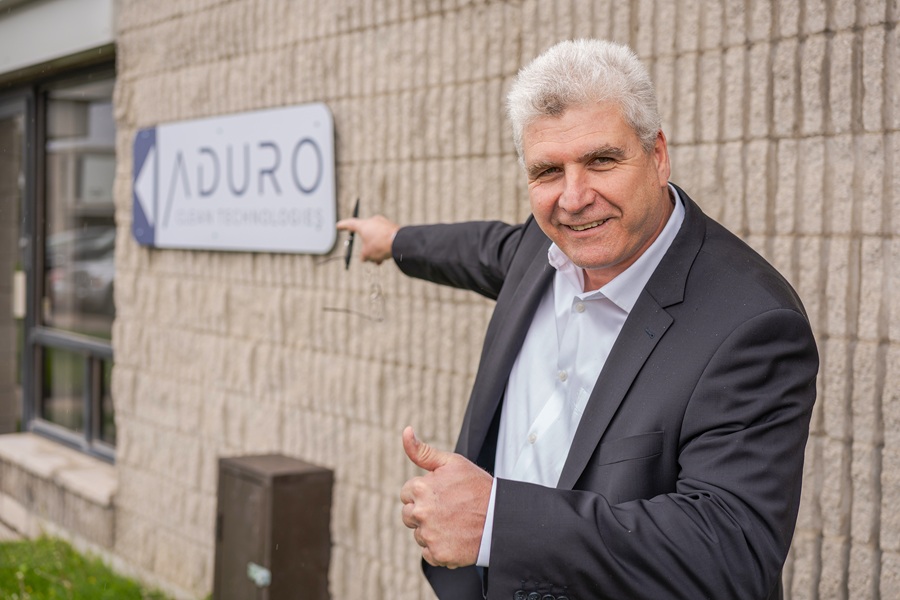Pioneering sustainable solutions
Using the power of chemistry, Aduro Clean Technologies is aiming to revolutionize the recycling and energy conversion industry
Photo: Aduro Clean Technologies CEO Ofer Vicus
IN JANUARY OF this year, representatives from Aduro Clean Technologies were in New York City to ring the closing bell of the Nasdaq stock exchange. Surrounded by a group of staff, CEO Ofer Vicus offered a thumbs up; CFO Mena Beshay pumped his fist in the air.
Click here to view this article in magazine format
“While the bell may have signaled the close of trading for the day, for us, it represented the opening of a new chapter,” said Aduro in a statement. “One filled with innovation, growth and game-changing advancements in the field of chemical technologies that drive sustainability and circularity.”
Story Continues Below
It isn’t every day that a company from London rings the closing bell of the Nasdaq, and if this is the first you’ve heard of Aduro, you’re not alone. The company — founded nearly 15 years ago in 2011 — has been happy to fly under the radar. “The reason you’ve never heard of us is because before 2021, we didn’t have a website. We didn’t have a social footprint. We had nothing,” says Vicus. “There was no reason for you to even think of us.”
The other reason might be that few people think much, if at all, about chemical recycling and the intricacies of turning various low-value materials — from plastic detritus from manufacturing to heavy crude — into usable higher value fuels and components for consumer applications.
 Photo: Aduro Clean’s R2 plastic reactor
Photo: Aduro Clean’s R2 plastic reactor
For decades, this kind of chemical recycling has been done via a method called pyrolysis — a high-heat method of breaking down molecules. What Aduro has patented is a process it calls Hydrochemolytic Technology, which in the company’s words, “works with water to make big, stubborn molecules smaller and more useful.”
The technology is something Aduro developed through partnerships with engineers at Western University, which they began forging in the mid-2010s, starting with research on breaking down heavy oils more efficiently.
“We started with heavy oil, and we moved from heavy oil to renewable oil, and after renewable oil we realized this [technology] is really quite cool for chemical recycling,” Vicus explains. “Lessons learned along the years gave us this direction, and we just continue to develop it to become a very unique technology.”
“Before 2021, we didn’t have a website. We didn’t have a social footprint. We had nothing. There was no reason for you to even think of us” —Ofer Vicus
In layman’s terms, what Aduro has patented is a chemical recycling technology that can process more materials, under more efficient conditions. That, says Vicus, opens up significant market opportunities; he estimates there’s a $200-billion market out there, comprising input materials that aren’t currently being recycled. “The value proposition there is that we can do it with a lower temperature, and have a higher tolerance to contamination,” he says. “Our yield is very, very high, and the value of this product is very, very high.”
The trick will be commercializing it, and the company’s focus has shifted from perfecting the technology to adapting it for industrial use. In 2022, the company announced the completion of its R2 reactor, and in 2024 announced that it was building a pilot plant at its facility on Newbold Street in south London that Vicus described as “a key platform for validating HCT’s performance in real-world conditions.”
Story Continues Below
To accommodate the plant, Aduro is expanding its footprint, adding another 2,000 square feet of lab, operations and office space, and Vicus says they should have a demonstration unit that is earning revenue by 2026.
When Vicus thinks about commercialization strategies over the longer term, he says there are multiple avenues the company could pursue. Aduro has relationships with big players in the petrochemical industry — they’re part of Shell’s GameChanger program, for instance — and Vicus says its technology is “very cheap compared to industrial processes.” However, he says the company is more likely to pursue licensing rather than become too involved in operations.

The value in the company, he says, is in their patents (seven granted, three in the application stage). “We definitely see opportunities to build and operate,” he says, but “really, our model is licensing. It’s a very rich IP company — we have a lot of intellectual property behind us.”
But those are decisions that remain a few years away, Vicus says. It’s been a long enough road — nearly a decade and a half — getting its technology close to market, and they certainly aren’t rushing things now. “We’re here already for 15 years, nobody knew,” he laughs. “It’s okay for us.” ![]() Kieran Delamont
Kieran Delamont

